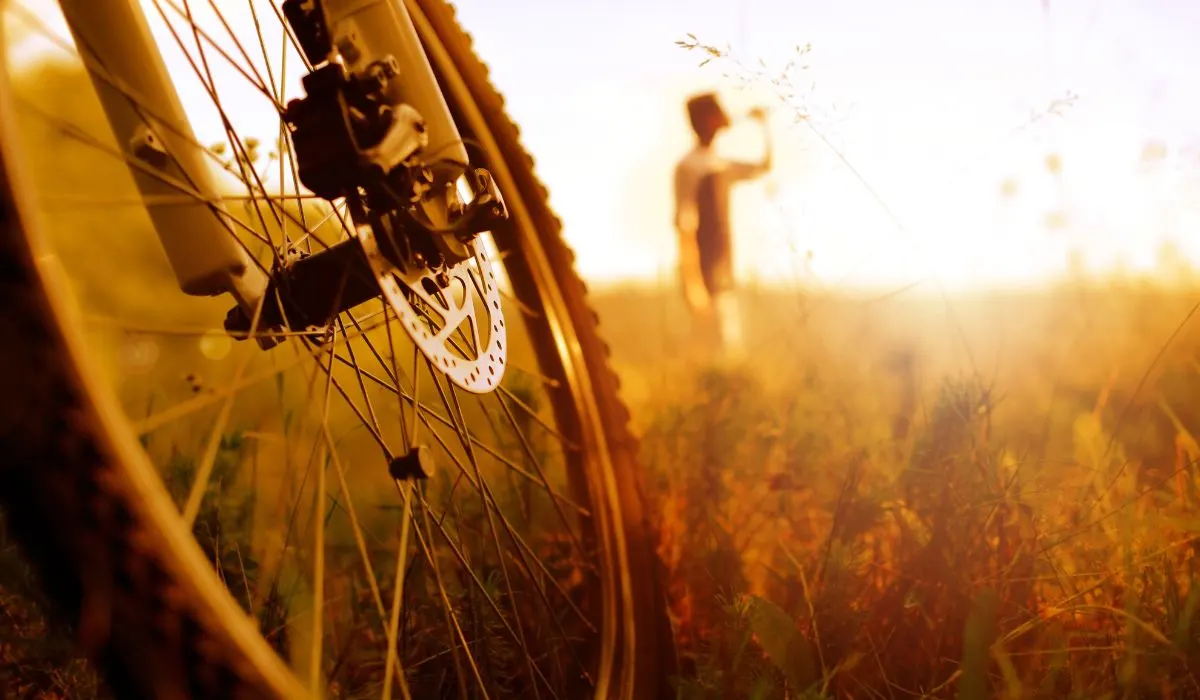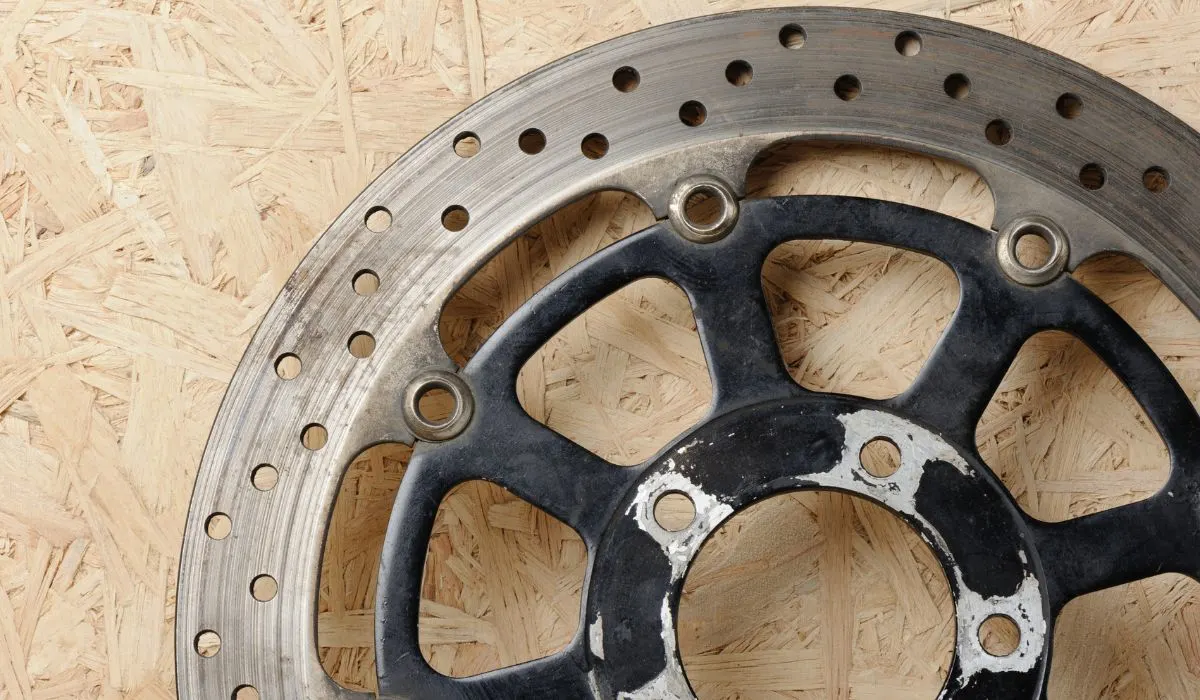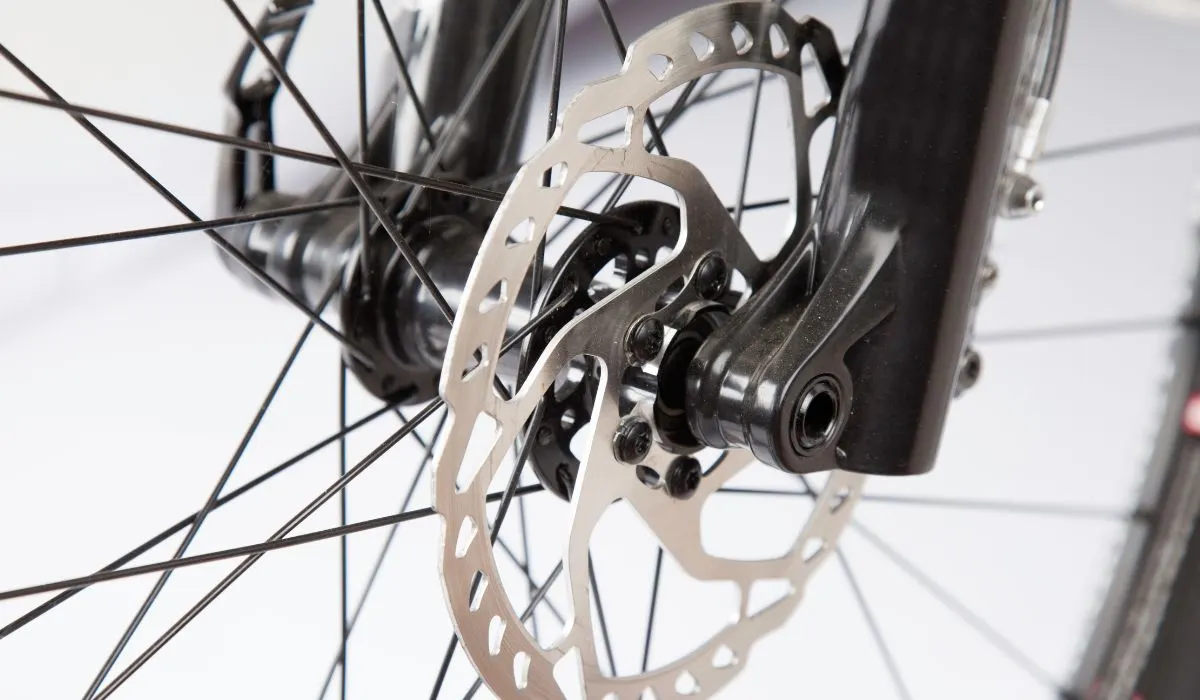
Disc brakes on your bike provide great control, especially on downhill runs, and whether on a road bike or mountain bike, will generally outlast conventional caliper brakes, but how long do disc brakes last on a bike?
Disc brakes should last between 500 and 700 miles and are made from resin, but if you use metallic sintered brakes, these can last between 1000 miles and 1250 miles. The lifespan of your disc brakes will depend on the:
- disc quality
- type of riding
- severity of braking
Let’s take a ride and look at:
- different kinds of disc brakes you can buy
- how riding conditions and styles would affect their lifespan
- how often they should be changed
- what to look for when they need changing
Which Disc Brakes Last Longer On A Bike
When this braking system surfaced, it was mostly for mountain bikes as the excessively steep downhills would burn through the standard caliper brake pads in no time. Taking a leaf from the automotive industry, MTB riders and manufacturers began applying disc brakes on mountain bikes.
There are three distinct types of disc brake pads:
- resin-type organic
- semi-metal
- sintered or metallic brakes
Let’s start with the resin or organic disc brake pads.
How Long Would Resin Disc Brakes Last On A Bike?
Organic disc brake pads are bound together with resin, and are usually made of:
- Kevlar (the same material used in bullet-proof vests)
- rubber
- silica
They deliver sharp braking and don’t need any warm-up time before bedding in.
They are quiet, so these are the best options if you don’t like the noisier metallic disc brakes. Resin is a softer compound than sinter/metallic or semi-metallic, and they bite well at low temperatures, but this type of disc brake won’t last as long and needs more frequent replacing.
Resin disc brakes will last between 500-700 miles. They will also see faster wear and tear in a dirty or wet environment, reducing their lifespan. If you aren’t riding heavy trails with plenty of mud and dirt, resin brakes would not be the ideal option.
How Long Do Sinter/Metallic Brake Discs Last On A Bike?
Sintered or metallic disc brakes will last between 1000 miles and 1250 miles because they are made from metallic particles that have been pressed together. Metallic brake pads will be more durable than resin and more resistant to heat and wetness.
Metallic brake disc pads will take longer to bed in, and the initial rides are better where there is no requirement for severe braking, as you may find yourself sliding rather than braking.
TIP: These brake pads are perfectly suited to extreme downhill riding or muddy conditions.
Once sintered disc brakes are bedded in, they provide excellent stopping power under severe braking conditions. So if downhill extreme is your kind of ride, then metallic disc brakes should be your first choice.
How Long Do Semi-Metallic Disc Brakes Last On A Bike?
Semi-metallic breaks are a hybrid between organic resin and metallic, providing an overall quality performance with a balance between quick response and durability.
As a blend between the organic and metallic disc brakes, they are composed of an organic compound that also uses metallic particles to extend their lifespan. Semi-metallic disc brakes provide significantly better braking power on downhills than organics and don’t need to warm up as much as sintered disc brakes.
Semi-metallic disc brakes last between 700 and 1000 miles on a bike, but they could conceivably last longer depending on the braking frequency and intensity.

How The Quality Of Disc Brakes Affects How Long They Last
The perception that you get what you pay for is equally true regarding disc brakes on a bike. Of course, not everyone can afford top-of-the-line products, especially amateur riders who don’t have the luxury of sponsorship.
Basing the type and quality of the brakes you buy purely on price may not be the best option, especially if you are primarily downhill or extreme riding. Remember that your brakes are the only thing between you and hitting something solid, so it would be advisable to opt for the best quality brakes you can afford.
However, if you have bought a good quality mountain bike with a disc braking system, the chances are pretty solid that it will come with a set of decent brakes that will match the type of riding and meet your braking requirements.
While you don’t necessarily have to splash out on the top-line products, it’s advisable to avoid the bottom-of-the-barrel products, which will only save you a few dollars upfront. Over the medium and long term, you will replace cheaper disc brakes more often, costing you more in the long run.
Another consideration for not using cheaper disc brakes on a bike is that they may fail under extreme conditions like heat and moisture, which would put you at risk should your brakes fail when you need them most.
How Long Disc Brakes Will Last On A Bike Will Depend On How You Ride
One of the major contributing factors when determining how long your disc brakes will last on your bike is the:
- riding you do
- frequency
- stresses you put on your braking system
Organic disc brakes will last a lot longer than the 500 miles minimum if you only make gentle trail rides with no:
- severe downhills
- excessive mud
- dirt
- water
You could easily double that lifespan if you aren’t putting the disc brakes under excessive strain. The same would apply to using semi-metallic or sintered disc brakes, which would last even longer under milder riding conditions.
Of course, the converse is equally true, and using organic brakes on extreme downhills and in rugged conditions will not only burn through them very quickly but put you at risk when you need the braking power to stop.
The mileage on organic disc brakes under normal conditions would be between 500 and 700 miles, but this could well be cut in half under harsh riding conditions.
The more durable disc brakes, such as the metallic sets, would be specified for 1000 miles under extreme conditions as this is what they were designed for.
Semi-metallic disc brakes may suffer some early degeneration under harsh conditions, so you must know the kind of biking you will be doing before making a final choice on which kind of disc brakes you would fit into your bike.

Maintain Your Disc Brakes To Have Them Last Longer On Your Bike
Another consideration is how well you maintain the disc brakes on your bike. Water can cause a lack of traction under braking, and disc brakes will wear down faster with accumulated:
- dirt
- dust
- water
TIP: To make your disc brakes last longer and perform better when you need them to, clean your disc brakes after each ride.
If you have softer resin disc brakes or even hybrid semi-metallic ones, keeping them free of dirt and debris will extend their lifespan. Even if you have the sintered disc brakes, check them with your finger (after they have cooled down) to ensure no residual particles on the discs and wheels will disrupt performance and durability.
When Do Your Disc Brakes Need To Be Changed?
As a rule, when you notice that your braking is not as sharp as it was, or there is a grinding or grating noise, this is usually an indication that your disc brakes are at the end of their lifespan and that you are going to need new ones fairly soon.
If this happens, don’t wait too long before changing them, because it could compromise braking safety and effectiveness. It’s usually advisable to keep a spare set of brakes on in your bike toolbox (like this one on Amazon) or your car, should you have to change them.
This is especially true if you are riding competitively, as riding under those conditions without effective braking would be dangerous for you and the riders around you.
Aside from the noise, if you suspect your disc brakes are coming to the end of their life, you can always perform a visual inspection to check how much padding is left. There should be at least 1mm of padding above the metallic base; if you see metal – those brakes are done and need to be changed.
NOTE: If your disc brakes get contaminated with brake fluid or oil, their braking efficiency will be compromised. Even if they still have plenty of tread remaining, they will need to be changed.
Brake cylinders that contain brake fluid must be in good condition. If they are compromised, it will shorten the lifespan of your disc brakes.

Conclusion
Disc brakes will generally last between 500 and 1250 miles depending on the type, with the softer organics lasting the least and the very hard metallics lasting the longest.
Matching the disc brakes on your bike to the style of riding you do the most will get you optimum performance from your disc brakes.
If you aren’t certain about the type of disc brakes you need, check with your bike shop and have them guide and advise you on the type and recommend a few brands that are affordable but still provide good quality performance.
After all, there should be no compromise regarding stopping power on a bike!
You might also be interested in:
